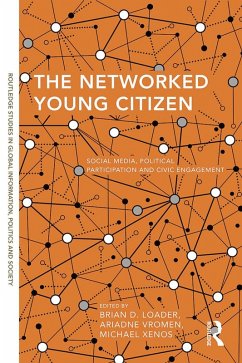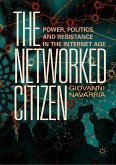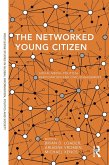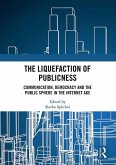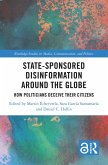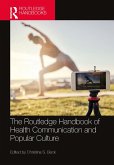The Networked Young Citizen (eBook, PDF)
Social Media, Political Participation and Civic Engagement
Redaktion: Loader, Brian D.; Xenos, Michael; Vromen, Ariadne
50,95 €
50,95 €
inkl. MwSt.
Sofort per Download lieferbar

25 °P sammeln
50,95 €
Als Download kaufen

50,95 €
inkl. MwSt.
Sofort per Download lieferbar

25 °P sammeln
Jetzt verschenken
Alle Infos zum eBook verschenken
50,95 €
inkl. MwSt.
Sofort per Download lieferbar
Alle Infos zum eBook verschenken

25 °P sammeln
The Networked Young Citizen (eBook, PDF)
Social Media, Political Participation and Civic Engagement
Redaktion: Loader, Brian D.; Xenos, Michael; Vromen, Ariadne
- Format: PDF
- Merkliste
- Auf die Merkliste
- Bewerten Bewerten
- Teilen
- Produkt teilen
- Produkterinnerung
- Produkterinnerung

Bitte loggen Sie sich zunächst in Ihr Kundenkonto ein oder registrieren Sie sich bei
bücher.de, um das eBook-Abo tolino select nutzen zu können.
Hier können Sie sich einloggen
Hier können Sie sich einloggen
Sie sind bereits eingeloggt. Klicken Sie auf 2. tolino select Abo, um fortzufahren.

Bitte loggen Sie sich zunächst in Ihr Kundenkonto ein oder registrieren Sie sich bei bücher.de, um das eBook-Abo tolino select nutzen zu können.
This collection, comprising contributions from a number of leading international scholars in this field, examines such themes as the possible effects of social media use upon patterns of political socialization; the potential of social media to ameliorate young people's political inequality; the role of social media communications for enhancing the civic education curriculum; and evidence for social media manifesting new forms of political engagement and participation by young citizens.
- Geräte: PC
- mit Kopierschutz
- eBook Hilfe
- Größe: 1.26MB
Andere Kunden interessierten sich auch für
![The Networked Citizen (eBook, PDF) The Networked Citizen (eBook, PDF)]() Giovanni NavarriaThe Networked Citizen (eBook, PDF)65,95 €
Giovanni NavarriaThe Networked Citizen (eBook, PDF)65,95 €![The Networked Young Citizen (eBook, ePUB) The Networked Young Citizen (eBook, ePUB)]() The Networked Young Citizen (eBook, ePUB)50,95 €
The Networked Young Citizen (eBook, ePUB)50,95 €![The Liquefaction of Publicness (eBook, PDF) The Liquefaction of Publicness (eBook, PDF)]() The Liquefaction of Publicness (eBook, PDF)41,95 €
The Liquefaction of Publicness (eBook, PDF)41,95 €![State-Sponsored Disinformation Around the Globe (eBook, PDF) State-Sponsored Disinformation Around the Globe (eBook, PDF)]() State-Sponsored Disinformation Around the Globe (eBook, PDF)42,95 €
State-Sponsored Disinformation Around the Globe (eBook, PDF)42,95 €![The Routledge Handbook of Health Communication and Popular Culture (eBook, PDF) The Routledge Handbook of Health Communication and Popular Culture (eBook, PDF)]() The Routledge Handbook of Health Communication and Popular Culture (eBook, PDF)46,95 €
The Routledge Handbook of Health Communication and Popular Culture (eBook, PDF)46,95 €![Routledge Handbook of Science, Technology, and Society (eBook, PDF) Routledge Handbook of Science, Technology, and Society (eBook, PDF)]() Routledge Handbook of Science, Technology, and Society (eBook, PDF)48,95 €
Routledge Handbook of Science, Technology, and Society (eBook, PDF)48,95 €![Photojournalism and Citizen Journalism (eBook, PDF) Photojournalism and Citizen Journalism (eBook, PDF)]() Photojournalism and Citizen Journalism (eBook, PDF)46,95 €
Photojournalism and Citizen Journalism (eBook, PDF)46,95 €-
-
-
This collection, comprising contributions from a number of leading international scholars in this field, examines such themes as the possible effects of social media use upon patterns of political socialization; the potential of social media to ameliorate young people's political inequality; the role of social media communications for enhancing the civic education curriculum; and evidence for social media manifesting new forms of political engagement and participation by young citizens.
Dieser Download kann aus rechtlichen Gründen nur mit Rechnungsadresse in A, B, BG, CY, CZ, D, DK, EW, E, FIN, F, GR, HR, H, IRL, I, LT, L, LR, M, NL, PL, P, R, S, SLO, SK ausgeliefert werden.
Produktdetails
- Produktdetails
- Verlag: Taylor & Francis eBooks
- Seitenzahl: 228
- Erscheinungstermin: 5. Juni 2014
- Englisch
- ISBN-13: 9781317696940
- Artikelnr.: 41066149
- Verlag: Taylor & Francis eBooks
- Seitenzahl: 228
- Erscheinungstermin: 5. Juni 2014
- Englisch
- ISBN-13: 9781317696940
- Artikelnr.: 41066149
- Herstellerkennzeichnung Die Herstellerinformationen sind derzeit nicht verfügbar.
Brian D. Loader is Associate-Director of the Science and Technology Studies Unit (SATSU) based at the University of York, UK. His academic interests are focussed around the emergence of new information and communications technologies (ICTs), such as the Internet, and the social, political and economic factors shaping their development and diffusion, and their implications for social, economic, governmental and cultural change. He is General Editor of the international journal Information, Communication and Society and has published extensively in this field. Recent books include Cyberprotest:New Media, Citizens and Social Movements, (Routledge, 2004); Young Citizens in the Digital Age (Routledge, 2007); Digital Welfare for the Third Age (Routledge, 2008). Ariadne Vromen is Associate Professor in the Department of Government and International Relations at the University of Sydney, in Australia. She has ongoing research interests in political participation, including on young people, politics and the internet. Michael Xenos is Associate Professor of Communication Science at the University of Wisconsin-Madison, USA. His research focuses on how the context and content of political communication influences the quality of democratic deliberation, public opinion, and civic engagement. He is particularly interested in how different aspects of political information environments affect processes of opinion formation and civic engagement. Some of his recent projects have explored how factors such as campaign intensity, negative campaigning, new communication technologies, and new sources of political information like late-night comedy and youth political websites, enable or constrain democratic citizenship.
1. Introduction: The Networked Young Citizen: Social Media, Political
Participation and Civic Engagement; Brian D. Loader, Ariadne Vromen and
Michael Xenos. PART I: Political Culture, Socialization and Social Media
Adoption. 2. The Great Equalizer? Patterns of Social Media Use and Youth
Political Engagement; Michael Xenos, Ariadne Vromen and Brian D. Loader. 3.
Spaces for Public Orientation? Longitudinal Effects of Internet Use in
Adolescence; Mats Ekström, Tobias Olsson, and Adam Shehata. 4. Political
Influence across Generations: Partisanship and Candidate Evaluations in the
2008 election; Emily Vraga, , Leticia Bode, Jung Hwan Yang, Stephanie
Edgerly, Kjerstin Thorson, Chris Wells, and Dhavan V. Shah. 5. Young
citizens and the fine art of disengaging online; Kjerstin Thorson. PART II:
Civics and Citizenship Education. 6. Australian reflections on learning to
be citizens in and with the social web; Suzanne Mellor. 7. Perceptions of
students and teachers in England about how social media are used (and how
they could be used) in schools and elsewhere; Ian Davies and Edda Sant.
PART III: Agency, Mobilization and the Voice of the Young Citizen. 8. "The
Outraged Young": Young Europeans, Civic Engagement and the Social Media in
a Time of Crisis; JamesSloam. 9. The Contribution of Websites and Blogs to
the Students' Protest Communication Tactics during the 2010 UK University
Occupations; Yannis Theocharis
Participation and Civic Engagement; Brian D. Loader, Ariadne Vromen and
Michael Xenos. PART I: Political Culture, Socialization and Social Media
Adoption. 2. The Great Equalizer? Patterns of Social Media Use and Youth
Political Engagement; Michael Xenos, Ariadne Vromen and Brian D. Loader. 3.
Spaces for Public Orientation? Longitudinal Effects of Internet Use in
Adolescence; Mats Ekström, Tobias Olsson, and Adam Shehata. 4. Political
Influence across Generations: Partisanship and Candidate Evaluations in the
2008 election; Emily Vraga, , Leticia Bode, Jung Hwan Yang, Stephanie
Edgerly, Kjerstin Thorson, Chris Wells, and Dhavan V. Shah. 5. Young
citizens and the fine art of disengaging online; Kjerstin Thorson. PART II:
Civics and Citizenship Education. 6. Australian reflections on learning to
be citizens in and with the social web; Suzanne Mellor. 7. Perceptions of
students and teachers in England about how social media are used (and how
they could be used) in schools and elsewhere; Ian Davies and Edda Sant.
PART III: Agency, Mobilization and the Voice of the Young Citizen. 8. "The
Outraged Young": Young Europeans, Civic Engagement and the Social Media in
a Time of Crisis; JamesSloam. 9. The Contribution of Websites and Blogs to
the Students' Protest Communication Tactics during the 2010 UK University
Occupations; Yannis Theocharis
1. Introduction: The Networked Young Citizen: Social Media, Political
Participation and Civic Engagement; Brian D. Loader, Ariadne Vromen and
Michael Xenos. PART I: Political Culture, Socialization and Social Media
Adoption. 2. The Great Equalizer? Patterns of Social Media Use and Youth
Political Engagement; Michael Xenos, Ariadne Vromen and Brian D. Loader. 3.
Spaces for Public Orientation? Longitudinal Effects of Internet Use in
Adolescence; Mats Ekström, Tobias Olsson, and Adam Shehata. 4. Political
Influence across Generations: Partisanship and Candidate Evaluations in the
2008 election; Emily Vraga, , Leticia Bode, Jung Hwan Yang, Stephanie
Edgerly, Kjerstin Thorson, Chris Wells, and Dhavan V. Shah. 5. Young
citizens and the fine art of disengaging online; Kjerstin Thorson. PART II:
Civics and Citizenship Education. 6. Australian reflections on learning to
be citizens in and with the social web; Suzanne Mellor. 7. Perceptions of
students and teachers in England about how social media are used (and how
they could be used) in schools and elsewhere; Ian Davies and Edda Sant.
PART III: Agency, Mobilization and the Voice of the Young Citizen. 8. "The
Outraged Young": Young Europeans, Civic Engagement and the Social Media in
a Time of Crisis; JamesSloam. 9. The Contribution of Websites and Blogs to
the Students' Protest Communication Tactics during the 2010 UK University
Occupations; Yannis Theocharis
Participation and Civic Engagement; Brian D. Loader, Ariadne Vromen and
Michael Xenos. PART I: Political Culture, Socialization and Social Media
Adoption. 2. The Great Equalizer? Patterns of Social Media Use and Youth
Political Engagement; Michael Xenos, Ariadne Vromen and Brian D. Loader. 3.
Spaces for Public Orientation? Longitudinal Effects of Internet Use in
Adolescence; Mats Ekström, Tobias Olsson, and Adam Shehata. 4. Political
Influence across Generations: Partisanship and Candidate Evaluations in the
2008 election; Emily Vraga, , Leticia Bode, Jung Hwan Yang, Stephanie
Edgerly, Kjerstin Thorson, Chris Wells, and Dhavan V. Shah. 5. Young
citizens and the fine art of disengaging online; Kjerstin Thorson. PART II:
Civics and Citizenship Education. 6. Australian reflections on learning to
be citizens in and with the social web; Suzanne Mellor. 7. Perceptions of
students and teachers in England about how social media are used (and how
they could be used) in schools and elsewhere; Ian Davies and Edda Sant.
PART III: Agency, Mobilization and the Voice of the Young Citizen. 8. "The
Outraged Young": Young Europeans, Civic Engagement and the Social Media in
a Time of Crisis; JamesSloam. 9. The Contribution of Websites and Blogs to
the Students' Protest Communication Tactics during the 2010 UK University
Occupations; Yannis Theocharis
